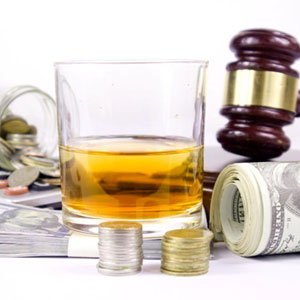Penalties and Additional Consequences in DWI Cases: A Comprehensive Guide

In this article, you can discover:
- An overview of the three tiers of penalties for first-time DWI offenders.
- Guidance on when to consider pleading guilty or not guilty in a DWI case.
- A comprehensive look at the long-term consequences of a DWI conviction.
What Are the Added Penalties and Enhancements for Aggravating Factors in a DWI Case?
The biggest aggravating factor in a DWI case is the breath test result itself, which determines the severity of penalties based on blood alcohol levels. For first-time offenders, there are three tiers:
Lower tier (<0.10 or no breath test result): This tier is punishable by fines and a short revocation period during which the person must install an alcohol ignition interlock device in their primary vehicle. They must also obtain a physical driver’s license with an interlock restriction imprinted on it.
Middle tier (0.10 to 0.15): This tier has similar consequences as the lower tier but with a seven- to 12-month interlock period.
Upper tier (≥0.15): This tier involves an initial indefinite revocation period, followed by a definite four- to six-month period during which the offender cannot drive at all, followed by a nine- to 15-month interlock restriction.
It’s important to consult with an attorney to understand the best course of action based on the specific circumstances of your case.
When Should I Plead Guilty or Not Guilty in a DWI Case?
Before deciding on whether to plead guilty or not guilty, you should wait until you’ve seen all the police reports and videos. If the evidence is not strong and your breath test result is below 0.15, you might consider going to trial, as the consequences after a plea compared to the consequences after a trial are usually not worth giving up the chance of an acquittal. However, if the evidence is overwhelming and you appear visibly intoxicated, the focus may shift to damage control and negotiating the best possible deal. Keep in mind that the decision should be made in consultation with an experienced attorney who can guide you based on the specifics of your case.

John Menzel, J.D.: Dedicated DWI Defense in New Jersey. With over 30 years of experience, committed to protecting your license, your freedom, and your reputation. Let's work together to beat that charge.
Request a Consultation Session (732) 218-9090
Should I Plead Guilty to My DWI and Get It Over With?
I generally do not recommend pleading guilty to a DWI. There is often no real upside to doing so, and a DWI conviction can have long-term consequences that may not be immediately apparent. These consequences include increased insurance premiums, mandatory state surcharges, job implications, and potential immigration issues for green card holders. Here are some specific examples of the consequences associated with a DWI or refusal conviction:
- Drunk Driving Enforcement Fund surcharge of $100 for each charge. J.S.A. 4-50.8.
- Additional $125 surcharge on a DWI conviction. J.S.A. 4-50(i).
- Victims of Crime Compensation Board assessment of $50 for a DWI conviction. J.S.A. 2C:43-3.1(c).
- Safe Neighborhoods Services Fund assessment of $75 for a DWI conviction. J.S.A. 2C:43-3.2(a)(1).
- Court costs of $33. J.S.A. 22A:3-4.
- Merit Rating Plan surcharges of $3,000 to $4,500. See N.J.S.A. 17:29A-35b(2).
- Suspension of the commercial motor vehicle driving privilege for no less than one and no more than three years for a first offense, J.S.A. 39:3-10.20(a)(1), and for life for a second or subsequent offense and certain first offenses, N.J.S.A. 39:3-10.20(c).
- Payment of unspecified fees as designated by the Division of Addiction Services upon referral or evaluation to the IDRC and Intoxicated Driver Program [“IDP”]. J.A.C. 10:162-2.4.
- Suspension of the driver’s license for failure to comply with IDRC and IDP program or fee requirements. J.A.C. 10:162-2.5.
- Cancellation of an existing automobile insurance policies. J.A.C. 11:3-8.9; see N.J.A.C. 11:3-34.4, N.J.A.C. 11:3-34 App. (re assessment of nine insurance eligibility points).
- Denial of an application for automobile insurance coverage. See N.J.A.C. 11:3-33, App.B; see also N.J.A.C. 11:3-34.4, J.A.C. 11:3-34 App. (re assessment of nine insurance eligibility points).
- Elimination of any cause of action to recover economic or non-economic loss sustained as the result of an accident for any person convicted of a violation of DWI or breath test refusal. J.S.A. 39:6A-4.5(b).
- Disqualification to get courtesy license plates for 10 years. J.S.A. 39:3-33.5(a), N.J.A.C. 13:20-34.4(b).
- Disqualification to get personalized license plates forever. J.S.A. 39:3-33.5a; see N.J.A.C. 13:20-34.4(b), N.J.A.C. 13:20-39.10(a).
- Disqualification from employment as a driver for a livery transportation service. J.A.C. 10:50-1.10(d)(1).
- Disqualification as a motor vehicle defensive driving course instructor or provider of an on-line or computer assisted course. J.A.C. 13:21-24.4(a) and (b); see N.J.A.C. 13:23-2.36(d), N.J.A.C. 13:23-3.12(b).
- Disqualification as a motorcycle safety education rider coach. J.A.C. 13:85-6.1(a).
- Ineligibility to enter Canada.
It is crucial to consult with an attorney who can help you weigh the pros and cons of pleading guilty and advise you on the best course of action for your unique situation.
For more information on Aggravating Factors In A New Jersey DWI Case, an initial consultation is your next best step. Get the information and legal answers you are seeking by calling (732) 218-9090 today.

John Menzel, J.D.: Dedicated DWI Defense in New Jersey. With over 30 years of experience, committed to protecting your license, your freedom, and your reputation. Let's work together to beat that charge.
Request a Consultation Session (732) 218-9090
